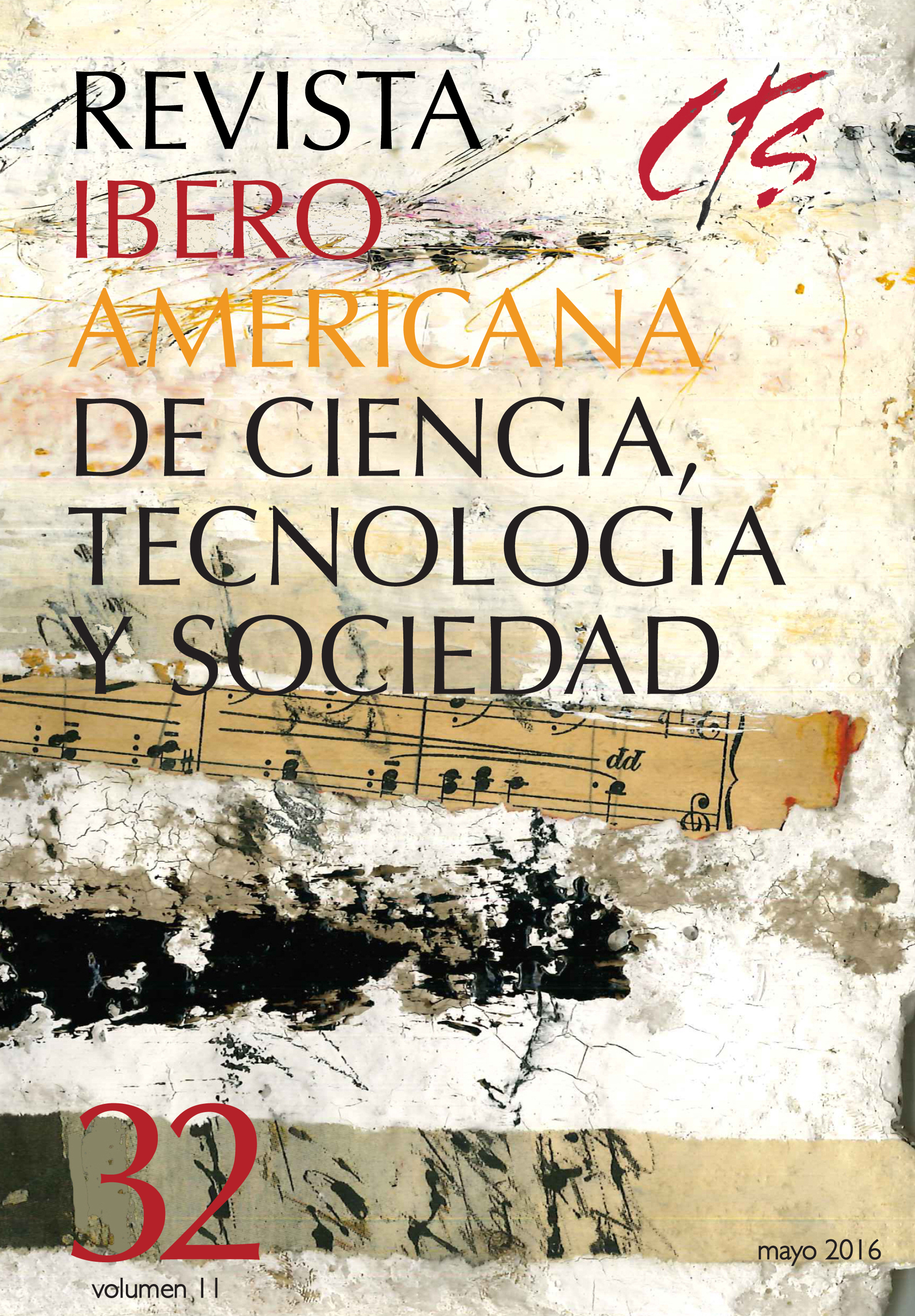O valor das tecnologias entranháveis
DOI:
https://doi.org/10.52712/issn.1850-0013-464Palavras-chave:
tecnologia, alienação, tecnologias entranháveis, commonsResumo
Convivemos com tecnologias que não conhecemos. Nossas interpretações e representação mental e social sobre elas raramente coincidem com o que são. A tese da alienação tecnológica ganhou grande força dentro do campo dos estudos CTS, e a tradição crítica teve grande importância para a sua justificativa. Porém, quando tentamos encontrar um modo de evitar a alienação tecnológica, percebemos que os caminhos mais comuns se transformam em imperativos tão duros quanto os imperativos tecnocratas. Neste trabalho, tentaremos uma aproximação às “tecnologias entranháveis” como uma saída da alienação de um modo mais democrático e racional, mas, especialmente, uma saída em concordância com o nosso tempo.
Downloads
Referências
CORREA LUCERO, H y GONZALEZ, J. (2014): “El lugar de la estructura social capitalista en la concepción de las tecnologías entrañables. Apuntes críticos sobre la propuesta de Miguel Ángel Quintanilla”, Revista Iberoamericana de Ciencia, Tecnología y Sociedad - CTS, vol. 9, nº 27, pp. 207-213.
DEBORD, G. (1967): “La sociedad del espectáculo”. Disponible en: http://serbal.pntic.mec.es/~cmunoz11/Societe.pdf. Consultado el 22 de septiembre de 2015.
ELLUL, J. (2003): La edad de la técnica, Editions Economica, Barcelona, Octaedro S.L.
FEENBERG, A. (1991): Critical Theory of Technology, Oxford University Press.
FEENBERG, A. (2005): “Teoría Crítica de la Tecnología”, Revista Iberoamericana de Ciencia, Tecnología y Sociedad -CTS, vol. 2, nº 5, pp. 109-123.
GIULIANO, G. (2013): “La teoría crítica de la tecnología: una aproximación desde la ingeniería”, Revista Iberoamericana de Ciencia, Tecnología y Sociedad -CTS, vol. 8, nº 24, pp. 65-76. Disponible en: http://www.revistacts.net/component/content/article /132-volumen-8-numero-24/articulos/555-la-teoria-critica-de-la-tecnologia-una- aproximacion-desde-la-ingenieria.
GIULIANO, G., PARSELIS, M. y VASEN, F. (2014): “Pensar los Artefactos”, en G. Duran, K. Ferrando, A. Gallo, G. Giuliano y G. Rodri?guez (coords.): Introducción a la Ingeniería. Hacia la construcción de una propuesta formativa, Universidad Nacional de Rosario Editora, pp. 139-142.
GORZ, A. (1976): Estrategia Obrera y Neocapitalismo, México DF, Ediciones Era S. A. Traducción: Felipe Saravia.
LATOUCHE, S. (2008): La apuesta por el decrecimiento ¿Cómo salir del imaginario dominante?, Barcelona, Icaria Editorial S.A. Traducción: Patricia Astorga.
MUMFORD, L. (2010): El mito de la máquina. Técnica y evolución humana, Logroño, Pepitas de Calabaza. Traducción: Arcadio Rigodón.
PARSELIS, M. (2015): “Conocimiento débil. Cuestiones sobre diseño tecnológico”, Sociología y tecnociencia/Sociology & Technoscience/Sociologia e tecnociência, vol. 1, n° 5, pp. 1-9.
PARSELIS, M. (2010): De qué riesgos debemos defendernos. El riesgo y las posibilidades de la deliberación sobre ciencia y tecnología, III Congreso Iberoamericano de Filosofía de la Ciencia y de la Tecnología, Universidad Nacional de Tres de Febrero, Argentina, 6-9 septiembre. Disponible en: http://bibliotecadigital.uca.edu.ar/repositorio/contribuciones/riesgos-posibilidades- deliberacion-ciencia.pdf.
QUINTANILLA, M. A. (1989): Tecnología: un enfoque filosófico, Madrid, Fundesco. ISBN 84-86094-45-3.
QUINTANILLA, M. A. (1998): “Técnica y cultura”, Revista Teorema. Revista internacional de filosofía. Tecnos, vol. 17, n° 3. Disponible en: http://www.oei.es/ salactsi/teorema03.pdf. Consultado 5 de abril de 2010.
QUINTANILLA, M. A. (2002): “La democracia tecnológica”, Arbor, vol. CLXXIII, pp. 683-684., pp. 637-651. Disponible en: http://arbor.revistas.csic.es/index.php/arbor/ article/viewArticle/1143.
QUINTANILLA, M. A. (2009): “Tecnologías Entrañables”, Publico.es, edición del 24 de octubre de 2009. Disponible en: http://blogs.publico.es/delconsejoeditorial/351/ tecnologias-entranables. Consultado el 19 de julio de 2015.
STALLMAN, R. (2002): Free Software, Free Society, Boston, GNU Press (FSF), p. 3.
THOREAU, H. ([1854], 2004): Walden, or, Life in the Woods. Disponible en: http://etext.lib.virginia.edu/toc/modeng/public/ThoWald.html. Consultado el 15 de septiembre de 2015.
VERCELLI, A. (2006): “El diseño del entorno educativa y la producción colaborativa de los contenidos básicos comunes”, en A. Vercelli, y H. Thomas: Aprender la Libertad. Disponible en: http://www.aprenderlalibertad.org/aprenderlalibertad.pdf. Consultado el 3 de agosto de 2015.
ZAMAGNI, S. (2012). “Por una Economía del Bien Común”, en O. Groppa y C. Hoevel (eds.): Economía del don, Buenos Aires, Ciudad Nueva. pp. 27-28.
Downloads
Publicado
Como Citar
Edição
Seção
Licença
Copyright (c) 2023 CC Attribution 4.0

Este trabalho está licenciado sob uma licença Creative Commons Attribution 4.0 International License.
Todas os números de CTS e seus artigos individuais estão sob uma licença CC-BY.
Desde 2007, a CTS proporciona acesso livre, aberto e gratuito a todos seus conteúdos, incluídos o arquivo completo da edição quadrimestral e os diversos produtos apresentados na plataforma eletrônica. Esta decisão é baseada no entendimento de que fornecer acesso livre aos materiais publicados ajuda a ter uma maior e melhor troca de conhecimentos.
Por sua vez, em se tratando da edição quadrimestral, a revista permite aos repositórios institucionais e temáticos, bem como aos sites pessoais, o autoarquivo dos artigos na versão post-print ou versão editorial, logo após da publicação da versão definitiva de cada número e sob a condição de incorporar ao autoarquivo um link direcionado à fonte original.











